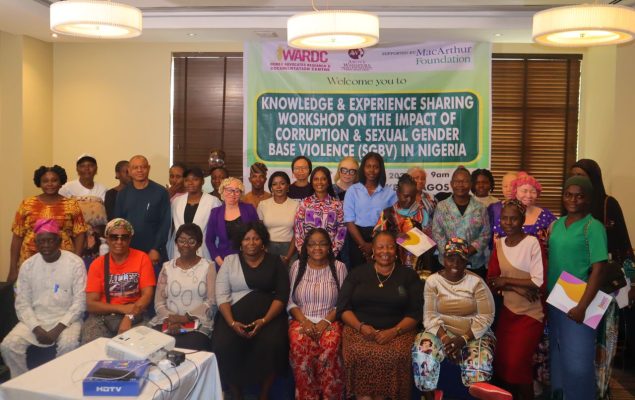Poised to find diverse solutions to the issue of corruption in the fight against Sexual and Gender Based Violence in Nigeria, Women Advocates Research and Documentation Centre, (WARDC) in collaboration with Above Whisper Foundation recently gathered key stakeholders to a crucial workshop tagged ‘Knowledge and Experience Sharing on the Impact of Corruption on Sexual and Gender-Based Violence (SGBV) in Nigeria’.
Attendees cut across different Ministries, Departments, and Agencies, participated in engaging discussions aimed at developing a workable action plan and implementation guideline to tackle impunity in the battle against SGBV in Nigeria.
Speaking at the workshop, founding director, WARDC, Dr. Abiola Akiyode-Afolabi emphasised the evolution of SGBV response networks across Nigeria, highlighting partnerships with the Ford Foundation to empower 12 organisations in the Southwest through Community Accountability Groups and the strategic engagement of traditional female leaders like the Iyalodes for deeper community access.
She stressed on corruption within law enforcement and community structures and how it undermines justice for survivors, citing the prolonged case of Mary Sunday as a stark example. Dr. Akiyode-Afolabi called for stronger multi-stakeholder collaboration among CSOs, government agencies, traditional leaders, and communities to demand accountability, amplify survivors’ voices, and develop alternative mechanisms when institutions fail to act, adding that collective action is essential to combat SGBV and systemic impunity.
CEO, Ceceyara Foundation, Bisi Ajayi-Kayode, believes that corruption has continued to have a negative impact on the systems put in place to provide justice to victims of SGBV. “The issue of corruption has a negative impact on SGBV. Corruption weakens the implementation of SGBV Laws and policies. It’s one thing to have the law on paper. If it’s not activated, the law is as good as a toothless bulldog that barks and cannot bite, which places a strong bar to access to justice,”
She described SGBV as a cancer eating into the fabric of society, and believes it doesn’t apply only to specific demographics, which is why it requires continuous and deliberate strategies: “You can see the escalating episode of femicide in our society. Especially on campuses. We have seen it at an unprecedented rate, which shows that we have a lot of work to do, and these perpetrators keep changing their strategies. They groom the survivors into silence,”
“One appalling thing about SGBV, is that there are no trouble-free zones. It is perpetrated by the high class, middle class and low class; both the literate and non-literate,” she added.
Ajayi-Kayode noted that the Lagos State Government was making significant progress in the battle against SGBV, but called for more State Governments to amplify efforts. She said all stakeholders need to get involved in the fight in order to achieve better results.
“For Lagos State, we are not stagnant. If you go out to other states, you would be shocked. Where senior law enforcement officials, government officials are saying ‘We cannot prosecute this man’ or ‘We cannot arrest him’ because he is the breadwinner. If so, then greater accountability should be demanded from him.
“So traditional leaders, religious leaders, community gatekeepers, your work is not complete if you cannot ensure prevention and response of SGBV in your State. We should have a strong level of hatred and resentment for SGBV because it is a crime against humanity.”
Acting Director for the Center for Gender Equality and Development Studies, Redeemers University, Ilesanmi Oluwatoyin, cited the domestication of anti-SGBV policies across all Nigerian States as a major issue hindering access to justice for victims.
“In terms of policy effort, especially with the enactment of Violence Against Persons Prohibition Act, the government has given us a policy document to work with. But the implementation as well as the domestication in various States, is a bit slim, but at least we have about 18 states which have actually domesticated the VAP Act and we now have it as a law in those States,” she said.
She noted that strategy sessions are vital in creating a roadmap for the execution of policies: “There is a need implement a proper action plan. When we do this, corruption will evidently be reduced. When we have a system that allows for impunity of perpetrators, such criminal acts will continue to be a menace in Nigeria.”



